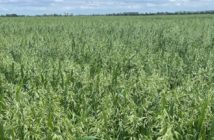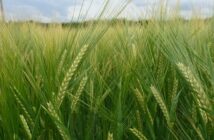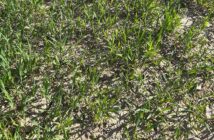Newark farmer and AHDB Monitor Farm host John Miller’s challenge is to make sure that his spring crop choices contribute to his financial stability, as well as his agronomic resilience.
Fifty percent of his rotation is in spring cropping. Like many farmers across the country now, his move to spring cropping was largely due to the fight with black-grass.
John’s spring cropping currently includes spring beans, spring barley, spring oats, maize and sugar beet, but is considering expanding the spring rotation even further.
At a recent Monitor Farm meeting, he was encouraged to consider alternative spring cropping to help expand his cropping plan and continue to build a profitable rotation.
John said: “My agronomist suggested I look at growing quinoa for human consumption, because I can already grow a lot of fat hen weeds on my land!”
The spring crop quinoa is sown in April, flowers in June and is harvested in September. It is related to the edible weed fat hen (Chenopodium album), and the seeds are harvested for use as an alternative grain.
Dr Sarah Cook, ADAS, said: “Bear in mind that there are very few chemicals available to treat quinoa with, so if John grows this crop he may well need to bring in an old weeding machine to pull out weeds between the rows. However, harvesting should be ok as he could harvest it with a normal combine.”
Before sowing a crop such as quinoa, however, John would need to secure a market.
“It’s crucial to have a firm market to sell those crops into, otherwise there’s no point,” he said.
Harry Henderson, AHDB Cereals & Oilseeds Knowledge Exchange Manager, said: “The first rule is to understand your market before you put the crop in the ground.”
Key considerations for unusual or niche crops:
Make sure you’ve got a market
Consider carefully the chemistry available
Will the harvesting times work for your farm?
As a final reminder, Sarah said: “As with precision farming, you’ve got to want to succeed.”
Get involved
The next meeting at the Newark Monitor Farm is on Wednesday 11 January 2017, when the topic up for discussion will be: how might we farm without subsidies?
Harry Henderson, AHDB Cereals & Oilseeds Knowledge Exchange Manager for the East Midlands, said: “We’ll be looking at how we might cut costs, in advance of an unknown future.”
For more information on the next meeting or the project, contact harry.henderson@ahdb.org.uk.




